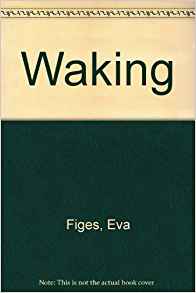I’d never heard of this author until my friend Nichael loaned me this book. It’s quite short, only 88 pages, but don’t be deceived. There’s a lifetime packed into this remarkable novel.
Each of the seven chapters takes us into the thoughts of our unnamed narrator at a different point in her life, from childhood to the edge of death. You may be reminded of Shakespeare’s seven ages of man, as described in a monologue by Jacques in As You Like It: infant, schoolboy, lover, soldier, justice, pantaloon (which refers to a commedia dell’arte figure signifying an old fool), and old age: “second childishness and mere oblivion, / Sans teeth, sans eyes, sans taste, sans everything.”
Figes’s achievement is to translate these into the seven ages of woman. Every chapter invites the reader to fall into the experience of that age, whether it’s an awkward adolescent exploring her new body or an aging woman who feels “the accumulation of failure, loss, nothing has turned out as I intended it should”.
The significance of the title is that these are the her thoughts at the moment of waking, that time when sleep and dreams have not yet drifted away, yet our thoughts are turning to what’s present: our body, others around us, curtains at the window. It is a liminal time, a threshold, when the night’s outsize fears mingle with hopes for the day. We mull over losses and satisfactions, cast upon the night’s shore.
In her excellent book The Artist’s Way, Julia Cameron recommends enhancing your creativity by writing Morning Pages. These are a few pages of freewriting, i.e., with no set topic. Of course, you could do them anytime, but she recommends the morning, when you first get up, because your unconscious is still active from its night’s work. You never know what will turn up.
What turns up here is stunning. I found myself wanting to cry out over and over: Yes, oh yes, I felt exactly that way. Each paragraph is packed with what Virginia Woolf called “moments of being”—moments of intense emotion, of living fully in the present. I recognised many, mostly ones I’d forgotten about.
I was so absorbed in the experience that it is only on rereading that I see how gorgeous Figes’s prose is, how intensely she uses all fives senses. I also see how subtle her transitions are, both within each chapter and between chapters. They are critical to making this stream of consciousness work smoothly and draw the reader along.
This novel is such a gem I am eager to read more of her work. I’m grateful for friends like Nichael who turn me on to new favorite authors.
Has a friend recommended a book to you that has turned out to be one of your favorite reads?

